ISLAMABAD/KARACHI/QUETTA: Former prime minister Imran Khan’s Pakistan Tehreek-e-Insaf (PTI) party on Saturday demanded the country’s top judge and election commission official to resign amid nationwide protests against alleged vote fraud on February 8, as the interim premier urged all political parties to resort to legal recourse to address their grievances.
Pakistan’s recent general elections were marred by a nationwide shutdown of cellphone service and unusually delayed results, leading to accusations of election manipulation. The PTI and several other parties refused to accept the outcome, with protest demonstrations breaking out in different parts of the country against irregularities in vote counting.
In a statement issued on Saturday evening, Caretaker Prime Minister Anwar-ul-Haq Kakar urged all political parties to realize that victory and defeat were “inherent aspects” of the democratic process and they should take try to seek justice for any instance of electoral fraud by going to courts.
“While peaceful protest and assembly are fundamental rights, any form of agitation, violence, or incitement for vigilantism will not be condoned and law would take its course without any hesitation,” Kakar was quoted as saying in a statement issued by his office.
“Anarchy and disorder will not be tolerated at this crucial time,” he continued. “This only serves to advance the agenda for hostile forces, both domestic and foreign, to exploit and create grave law and order challenges.”
The prime minister said the caretaker government implored patience, as several political parties were also engaging in consultations to form governments at the federal and provincial levels in accordance with democratic norms and traditions.
Khan’s party was severely hamstrung ahead of the national polls, with rallies banned, its party symbol taken away, and dozens of its candidates rejected to stand in the electoral contest. Despite these challenges, it pulled a major surprise when over 100 independent candidates, most of them loyal to its founding leader, won the National Assembly seats.
The PTI still urged its supporters to protest election rigging, saying it was deprived of a “two-third majority” in parliament.
Hours before the demonstrations were to kick off on Saturday, a senior bureaucrat and Commissioner of Rawalpindi Division, Liaquat Ali Chattha, held a news conference wherein he admitted to his involvement in manipulating the election results and blamed Pakistan’s chief justice and top official of the election commission for rigging.
“The chief election commissioner (CEC) has no legal and moral justification to remain in his office anymore,” the PTI said in a statement. “Hence, he should quit instantly and return PTI’s stolen seats immediately.”
The statement maintained Chattha’s confession of altering results in 13 national and 26 provincial constituencies was an endorsement of PTI’s stance that the public mandate had been compromised and had exposed the real characters involved in the election rigging.
The PTI said all officers involved in the “heinous plan of openly insulting the public mandate, including the CEC and the Chief Justice, should immediately resign after Liaquat Chattha’s statement.”
The chief justice and the election commission have already denied the allegations made by the Rawalpindi commissioner.
Meanwhile, in Islamabad, PTI senior vice president Sher Afzal Marwat led a charged crowd demanding justice for the alleged vote fraud.
“We will not rest until we get justice and get back our stolen public mandate,” he said.
PTI supporters took part in the protest in front of the National Press Club in the federal capital, carrying their party flags, placards inscribed with different slogans and Khan’s photographs.
“We have come here on Khan’s call to protest and get back our mandate,” Shumaila Satti, one of the protesters carrying Khan’s portrait, told Arab News.
“We are protesting because our mandate has been stolen,” said another PTI supporter, Shahid Ali Gandapur. “First, Imran Khan should be released [from prison], and then we will make him the prime minister.”
A similar protest was also held in Lahore where police briefly detained Salman Akram Raja, a renowned lawyer and PTI-backed candidate from NA-128.
“They are arresting me illegally,” he told journalists shortly before being taken away by the police. “I stand with the people and will continue to raise my voice for justice.”
Only a day ago, Raja told the international media in Islamabad he was leading the race by 100,000 votes before he was forced to leave the election office in violation of law. In the morning, he discovered that his opponent had secured 172,000 votes and defeated him.
The PTI shared the video of Raja’s arrest, calling it “Extremely shameful and disgusting act.”
Khan’s party held a small protest in Karachi as well that was led by its Sindh president, Haleem Adil Shaikh, outside the election commission office in the city.
“I am solely a citizen of Karachi,” said a protester who identified himself as Talat Siddiqui. “I am not affiliated with any political party, but I voted for PTI, and I believe it’s my right to ask for a fair vote count. My vote should be counted, and it was either not counted or counted incorrectly.”
Meanwhile, hundreds of protesters from PTI and other Baloch and Pashtun nationalist parties also poured into the streets of Pakistan’s southwestern Quetta city, demanding the election commission to revisit the outcome of the February 8 polls in their region which they said had been changed during the counting process.
“We won 180 seats which were decreased,” Alam Khan Kakar, additional deputy general secretary of PTI in Balochistan, told Arab News.
The protesters applauded the Rawalpindi commissioner’s statement along with his decision to step down from his position.
Government implores patience amid escalating protests, resignation calls over rigging claims
https://arab.news/6b8pb
Government implores patience amid escalating protests, resignation calls over rigging claims

- PM Kakar urges all parties to seek justice through courts, warns that ‘anarchy and disorder’ will not be tolerated
- Khan’s PTI seeks resignations of chief justice, top election commissioner official after rigging allegations against them
Pakistani Gavi chief warns slashed US funding threatens millions of children

- Donald Trump’s funding halt could affect 14 percent of global vaccine group’s budget
- Sania Nishtar warns 1.3 million children may die of vaccine-preventable diseases
GENEVA: A halt to US funding for Gavi, an organization that vaccinates children in the world’s poorest countries, will leave a dangerous gap threatening the lives of millions, its chief warned on Monday.
“The first impact would be for the most vulnerable children of the world,” Gavi chief executive Sania Nishtar told AFP.
She spoke via video link from Washington, during a visit to try to convince US authorities that their 25-year collaboration with the Geneva-based organization must continue.
The New York Times broke the news last week that President Donald Trump’s administration, which has been aggressively slashing foreign aid, aims to cut all funding to Gavi.
That step featured in a 281-page spreadsheet related to cuts to USAID that was sent to the US Congress.
The decision would impact about 14 percent of Gavi’s core budget — and came just days after the Congress had approved $300 million in funding for the organization.
“I was very, very surprised,” Nishtar said, adding that her organization still had received no official termination notice from the US government.
The medical doctor and former minister and senator in Pakistan said: “Gavi was supported by the previous Trump administration. We had a very good relationship.”
If the cuts go ahead, Nishtar warned it would have devastating effects.
“Frankly, this is too big a hole to be filled,” Nishtar warned, even as Gavi scrambled to find donors to offset the missing US funding.
“Something will have to be cut.”
Gavi says it helps vaccinate more than half the world’s children against infectious diseases including COVID-19, Ebola, malaria, rabies, polio, cholera, tuberculosis (TB), typhoid and yellow fever.
Since its inception in 2000, Gavi has provided vaccines to more than 1.1 billion children in 78 lower-income countries, “preventing more than 18.8 million future deaths,” it says.
Before the US decision, the organization has a goal of vaccinating 500 million more children between 2026 to 2030.
The US contribution is directly responsible for funding 75 million of those vaccinations, Nishtar said.
Without them, “around 1.3 million children will die from vaccine-preventable diseases.”
Beyond Gavi’s core immunization programs, the funding cut would jeopardize the stockpiling and roll-out of vaccines against outbreaks and in health emergencies, including for Ebola, cholera and mpox.
“The world’s ability to protect itself against outbreaks and health emergencies will be compromised,” Nishtar said.
During her Washington visit, the Gavi chief said she aimed to show how effective funding has been so far for her organization.
For every $1 spent on vaccinations in developing countries where Gavi operates, $21 will be saved this decade in “health care costs, lost wages and lost productivity from illness and death,” the vaccine group estimates.
Unlike other organizations facing cuts, Gavi has not received an outsized contribution from Washington toward its budget, Nishtar noted, insisting that the US contribution was proportionate to its share of the global economy.
Other donors were paying their “fair share,” while recipient countries also pitch in and are provided with a path to transition away from receiving aid, she said.
Some former recipients, like Indonesia, had even become donors to the program, she pointed out, voicing hope that such arguments would help sway Washington to decide to stay the course.
Without the US backing, “we will have to make difficult trade-offs,” Nishtar warned.
That “will leave us all more exposed.”
Afghanistan urges voluntary return of refugees as Pakistan resumes deportations

- Last month, Pakistan set a March 31 deadline for Afghan Citizen Card holders to return to their country on their own
- Afghan officials in Kabul seek humane treatment for refugees, saying even people with valid documents felt uncertainty
ISLAMABAD: The Taliban interim administration in Kabul on Tuesday urged Afghan refugees to return home voluntarily, as Pakistan resumed deportations following a March 31 deadline issued last month for undocumented migrants and Afghan Citizen Card (ACC) holders to leave the country.
Pakistan’s decision has coincided with the Eid Al-Fitr celebrations, casting a shadow over the religious holiday for thousands of Afghan families. The move is part of a broader repatriation drive launched in 2023, which has so far seen more than 800,000 Afghans expelled.
Pakistani authorities maintain Afghan nationals have been involved in militant attacks and organized crime, accusations Kabul denies.
The crackdown began amid a surge in violence by armed groups like the Tehreek-e-Taliban Pakistan (TTP) and the Baloch Liberation Army (BLA), whose leaders Islamabad claims are based in Afghanistan, a charge rejected by the Taliban administration.
“The Islamic Emirate has reiterated its call for the voluntary return of Afghan migrants as the celebration of Eid Al-Fitr already began,” Afghanistan’s state-run Bakhtar news agency reported on Tuesday. “This appeal comes in light of increasing deportations of Afghan refugees from neighboring countries, mainly Iran and Pakistan.”
“Mawlavi Abdul Kabir, the country’s Minister of Refugees and Repatriation, has urged neighboring countries to halt these deportations and allow Afghans to return home voluntarily,” it added. “He emphasized the importance of humane treatment for refugees, especially in light of reports of mistreatment of Afghans by border nations, including instances where individuals holding legal visas were also deported.”
The agency said Pakistan’s “renewed crackdown” had left even documented Afghan refugees uncertain about their future.
Last week, Afghan refugee leaders in Karachi held a press conference appealing to Pakistani authorities to reconsider the timing of the deportations.
“Pakistan has generously hosted us for nearly 47 years, and a large portion of these refugees were born in Pakistan,” said Hajji Abdullah Shah Bukhari, chairman of the refugee community in Sindh. “Even if the government decides to expel us, it should not be done during Eid.”
He rejected claims that Afghan refugees were involved in militancy, saying, “We ourselves are victims of war and terrorism.”
International rights groups have also urged Islamabad to halt the deportations, warning that some returning Afghans could face threats under Taliban rule.
Pakistan insists it is carrying out the deportation campaign in a humane manner, saying it respects the dignity of all Afghan nationals.
However, officials maintain that the country has hosted Afghan refugees for decades and it is now time for them to return.
Roast chicken made in ‘secret’ 12-spice marinade is Eid hit in northwestern Pakistan

- Customers have been showing up from far and wide to buy Degi Chargha from Rafi Ullah Safi’s shop in Qissa Khwani Bazaar
- Safi’s father concocted the recipe 50 years ago and since then, the marinade has become a local hit, with orders increasing for Eid
PESHAWAR: In the days leading up to the Eid Al-Fitr holiday, Rafi Ullah Safi is especially busy at his shop in Peshawar city’s historic Qissa Khwani Bazaar as customers arrive from across the Khyber Pakhtunkhwa province and beyond to order his Degi Chargha: a steamed chicken roast prepared in a secret marinade of 21 spices.
Safi’s father concocted the recipe over five decades ago and since then, the marination has become the stuff of legend, with orders spiking ahead of Eid and over the three days of the holiday as people buy the roast to serve at home or present as a gift to relatives and friends.
“The night before Eid day, we sit here till morning. There is a rush in the bazaar, people buy dresses and shoes, and some buy sweets and chicken,” Safi told Arab News as he packed an order for a customer.
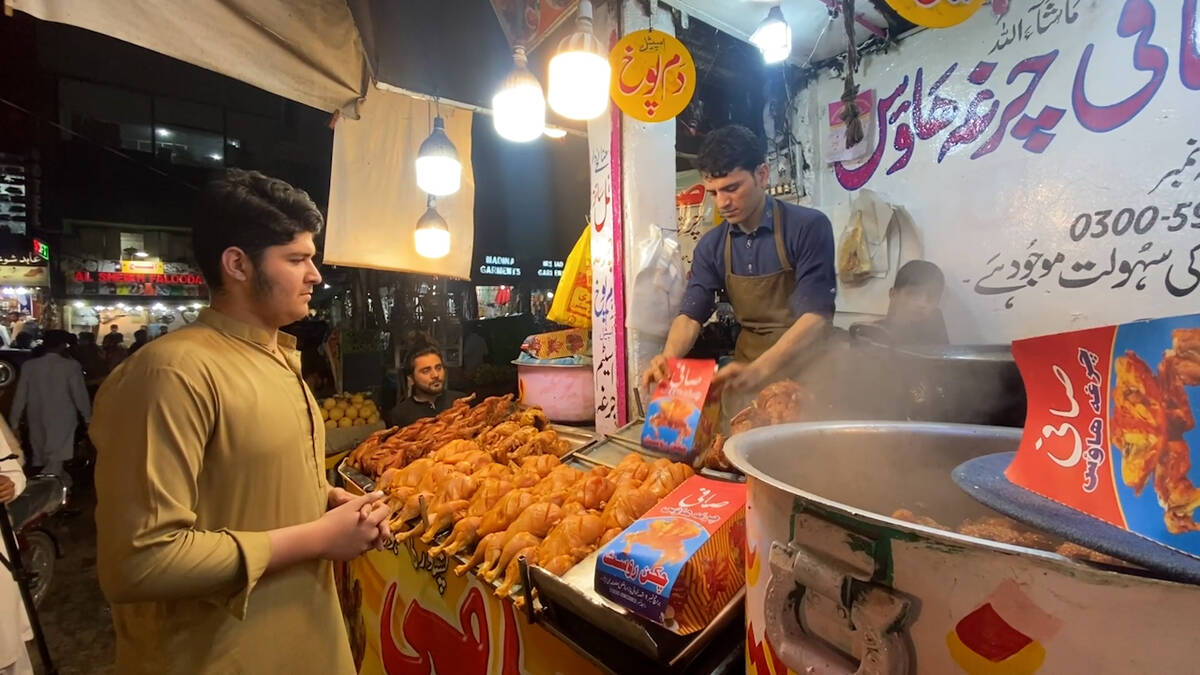
“We offer the morning prayer here [in Qissa Khwani Bazaar] and then go home. Then we offer the Eid congregation [the next morning] and people start calling us soon after to come to the shop to serve them Degi Chargha even on Eid day.”
Despite the roast’s popularity, the exact spices that go into the mix are only known to the family.
“All the ingredients are kept secret,” Safi said. “My father started the business and my elder brothers handled it when I was young. Then I joined in, and now my children are also working here.”
He said the recipe, passed down from his father to elder brothers and now him, was being learnt by his children.
“First, we take yoghurt and blend it properly, after which we put the 21 spices mix, ketchup, lemon and other things,” Safi said. “We also add some of the spices bought from the bazaar, which make our special mixture of spices stronger and sourer.”
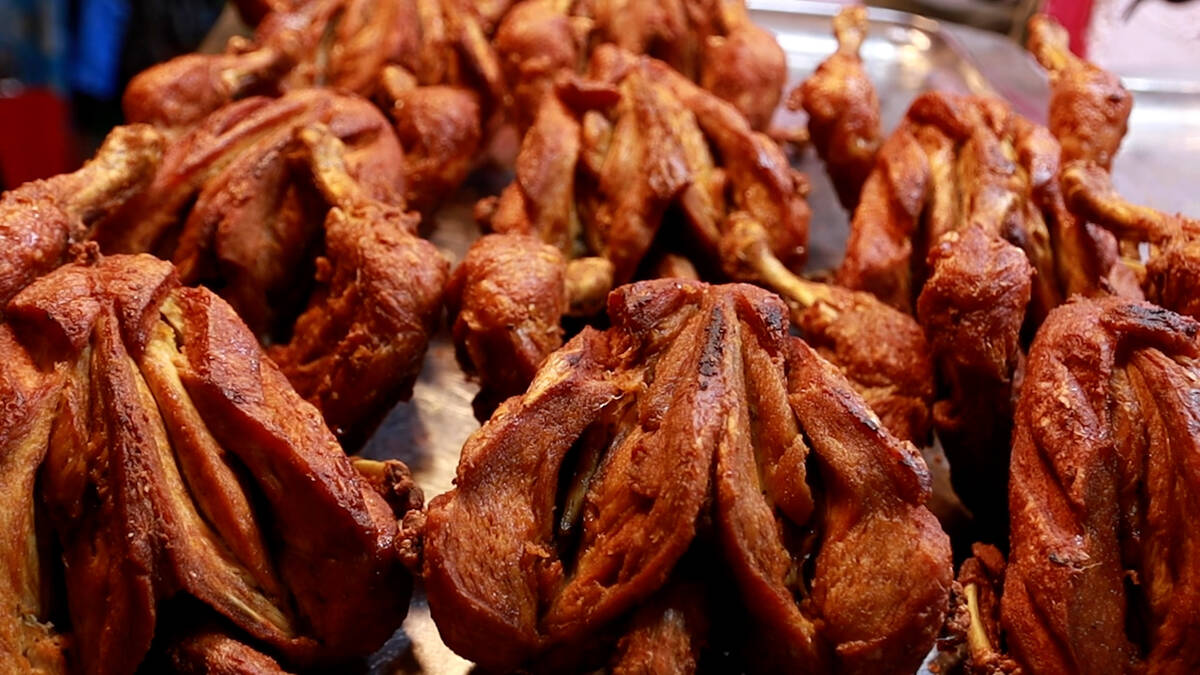
The spices are mixed in the yogurt with an electric churner for almost half an hour until the color changes to red, Safi explained. The mixture is prepared at his home early every morning before being brought to the shop.
The chicken meanwhile is deep fried in oil and then cooled for 30 minutes before being soaked in the spice and yogurt marinade.
“The chicken is dipped in the special spices and then placed in the steam pot, which is placed over boiling water for 20-30 minutes. Then the Degi Chargha is ready,” said Safi.
One full chicken retails for around $5 a piece.
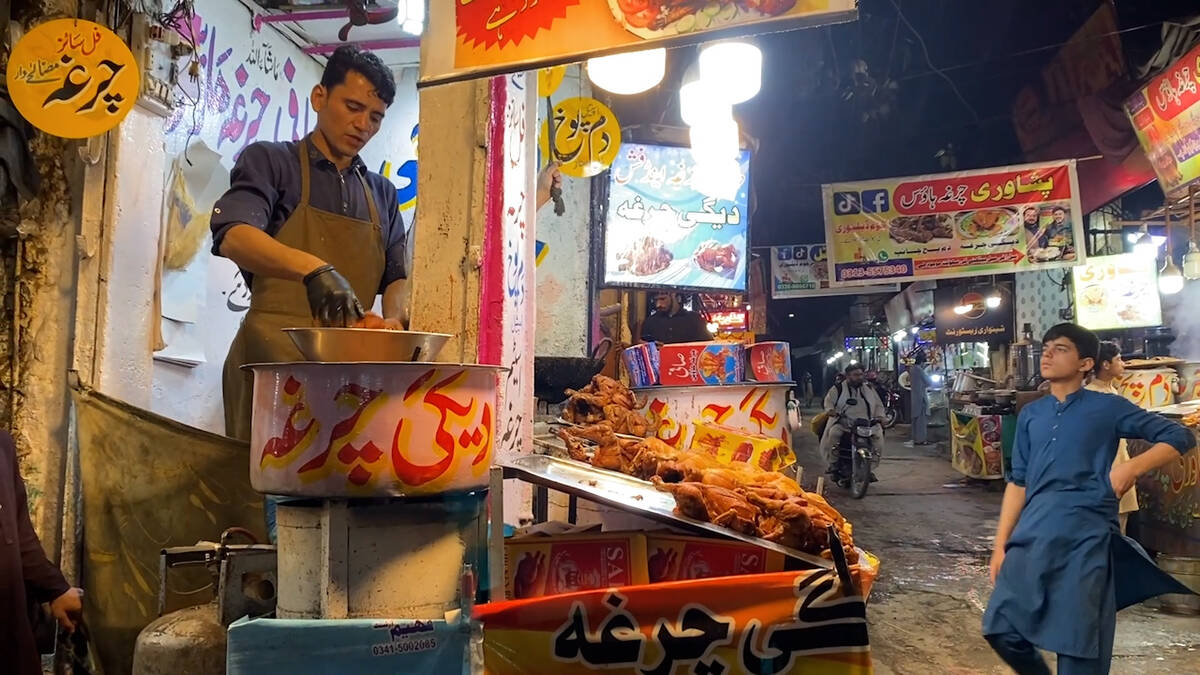
“The price is higher than usual roasts because of the specialty and uniqueness of the chicken,” Safi said.
Hammad Khan, a 22-year-old customer, said social media viral videos had increased the popularity of the Degi Chargha.
“Many food vloggers have made videos motivating others to come and taste it. That’s why I have come here to buy and check the taste of this chicken,” he said.
Another customer Hamza Khan, a resident of Peshawar’s Saddar Bazaar, also said he had discovered Degi Chargha through TikTok.
“I saw a video of this shop so we thought to go and give it a try,” he said. “The specialty was the spices added to the chicken. It enhances the taste. My experience was good.”
Faith in every shell: Karachi’s Hindu artisan honors Islamic art through seashell creations

- Babu Lal, 64, picks seashells and inscribes them with sacred Islamic names and verses
- Nearly 300 Hindu families in Karachi have kept seashell art tradition alive since before 1947
KARACHI: In a modest home situated in one of the narrow streets of a portside slum in the Pakistani megacity of Karachi, a 64-year-old artisan gently picked up a seashell, wiped it clean and began to inscribe it in ink with the names of Allah and the Prophet Muhammad (peace be upon him).
With careful strokes, he transformed the shell into a delicate showpiece, destined for display in upscale shops in Clifton and, eventually, homes across Pakistan. The piece is special, and so is the maker: Babu Lal, a Hindu by faith.
Hindus make up 2.14 percent of Pakistan’s population, according to the 2017 census, with a majority of them living in the southern Sindh province, of which Karachi is the capital. In many areas of Sindh, Hindus and Muslims have historically coexisted, though reports of discrimination and violence, such as forced conversions of Hindu girls, blasphemy accusations and land grabs, have increased in recent decades, drawing concern from human rights groups.
And yet, in Karachi’s coastal area of Ibrahim Haideri — along with parts of the Qur'angi and Clifton neighborhoods — nearly 300 Hindu families have kept this seashell art tradition alive, passing it down through generations since well before the country’s independence in 1947.
“Our art teaches respect for all religions, and we work for all religions,” Lal told Arab News, his weathered hands working on a shell.
“We first bring shells from the sea, then clean and wash them, and after that, we make art products from them and supply them to the market,” he said. “All the hard work and labor in this process is done by hand. There is no machine work involved.”
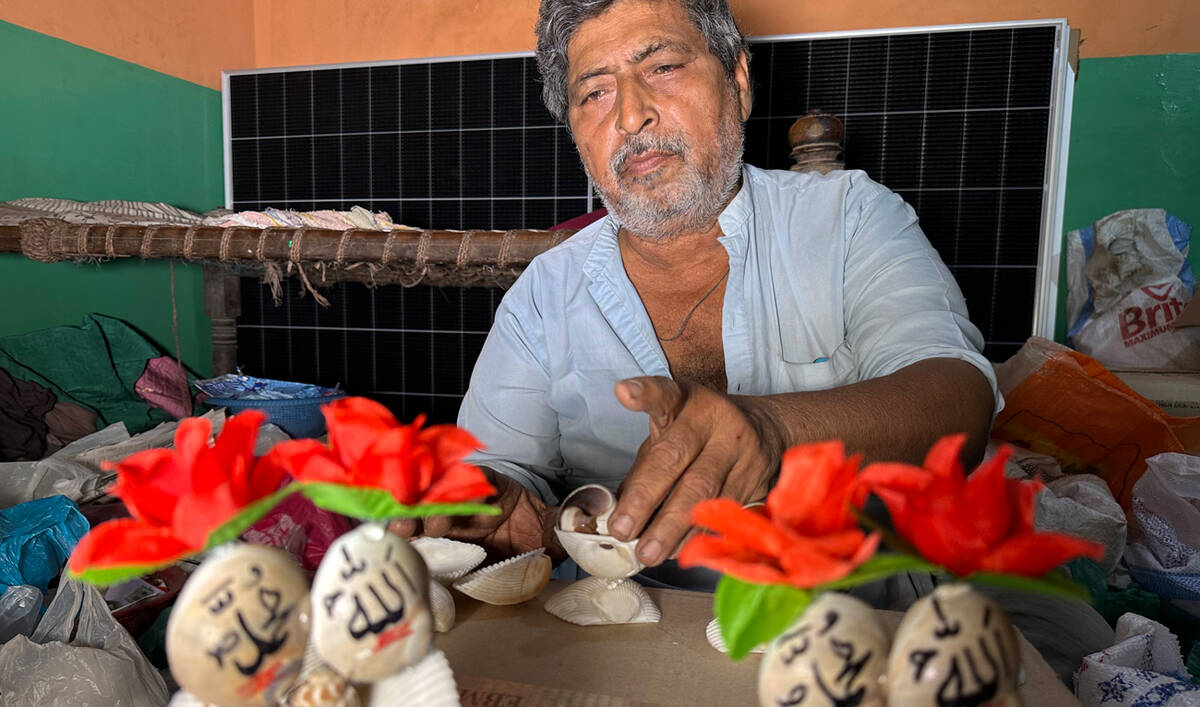
Lal’s creations include a wide range of items from keychains and glass ornaments to frames bearing sacred names and miniature replicas of the Holy Kaaba, among the most sought-after items in the market.
“While making these items, we take extra care in cleaning and handling them,” he said. “We do all this work quite carefully.”
UNCERTAIN FUTURE
Lal’s journey as an artisan began in childhood when he learned the trade by watching his father and grandfather at work over half a century ago.
But the future of the craft is now uncertain, due to a lack of institutional support and limited opportunities for artisans like himself. This has discouraged him from passing the craft on to his children.
Another problem, according to Lal, was that stalls set up by local artisans were now frequently dismantled and once busy sales spots for artists, including popular areas along the Clifton seafront and Manora, had been closed off in recent years.
“They no longer allow us to set up stalls there so what can we do?” the artist asked. “That’s why we want to stop this work. If you’ve seen the stalls at Clifton’s Sea View, those have also been shut down.”
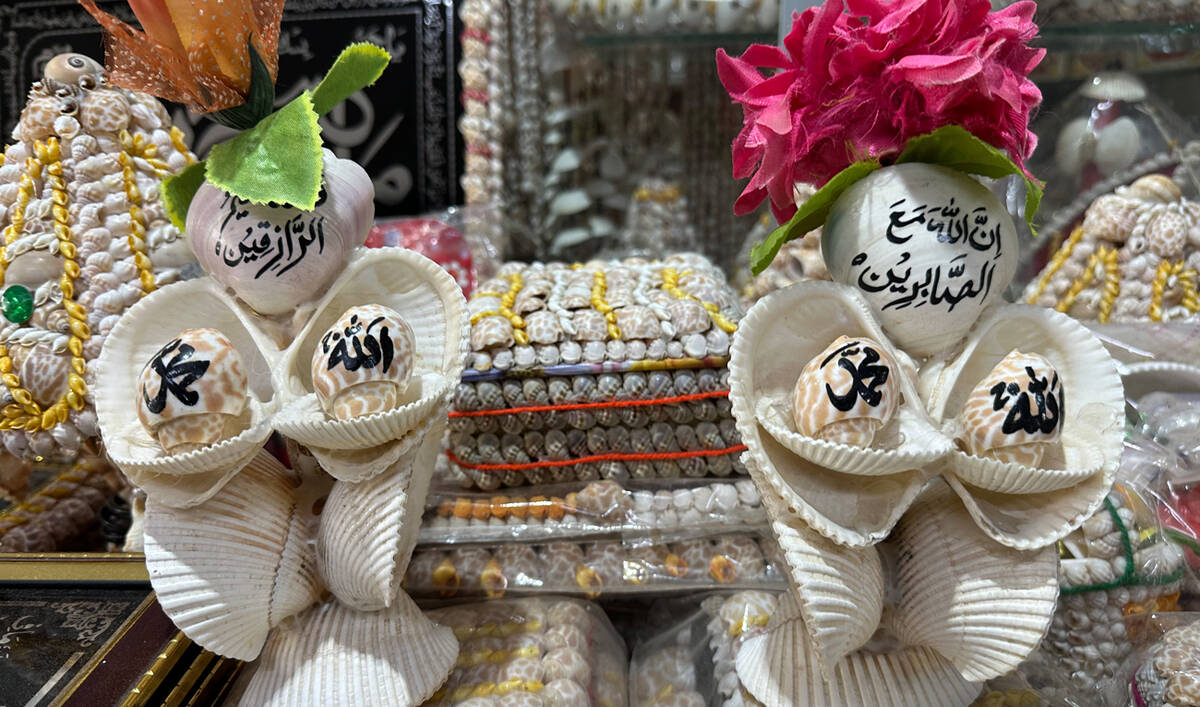
Despite these challenges, shopkeepers like Gul Sher Abbasi acknowledge Lal’s dedication and craftsmanship.
“These items mostly come from Babu,” Abbasi told Arab News. “Then, there are different people who manufacture and we get them as well.”
“Handcrafted items are something different,” he added. “The things that are made by hand are special. There is a different pleasure in preparing those things.”
Abbasi said the seashells’ craft held potential beyond Pakistan’s borders and with the right support, Lal’s handmade items could find buyers in Gulf countries like Saudi Arabia, the United Arab Emirates and Qatar.
Meanwhile, Lal said his art extended across religious lines, with orders coming in for Christian, Hindu and Muslim communities alike.
“We work for everyone, and we also make things based on specific orders,” he said. “If someone orders us to make an idol, we make it. If someone orders a cross, we make it.”
Pakistan PM extends greetings to UAE and Iranian leaders on Eid Al-Fitr

- Shehbaz Sharif acknowledges UAE’s longstanding support to Pakistan, seek stronger economic ties
- The prime minister also calls for closer cooperation with Iran to deal with border security challenges
ISLAMABAD: Prime Minister Shehbaz Sharif reached out to the leaders of the United Arab Emirates and Iran to extend Eid Al-Fitr greetings on Monday, highlighting Pakistan’s close ties with the two countries and calling for continued collaboration in areas of mutual interest.
Sharif has contacted the top leadership of several Muslim-majority nations since the end of Ramadan, including Gulf states, Malaysia and Bangladesh, in a diplomatic outreach that coincides with Pakistan’s efforts to attract foreign investment to bolster its struggling economy.
According to the Prime Minister’s Office, Sharif held “a warm and cordial telephone conversation” with UAE President Sheikh Mohamed bin Zayed Al Nahyan.
“The Prime Minister fondly recalled his recent meeting with the UAE President in Abu Dhabi last month and reaffirmed his strong resolve to transform the existing Pakistan-U.A.E. ties into a mutually beneficial economic partnership,” his office said in a statement. “He also expressed Pakistan’s deep appreciation for U.A.E.’s longstanding and steadfast support to Pakistan.”
The UAE president reciprocated the Eid greetings and reiterated his country’s “unwavering support for Pakistan’s economic and development initiatives,” while stressing the importance of continued collaboration across various fields.
Sharif also spoke with Iranian President Masoud Pezeshkian and extended Eid greetings to Iran’s Supreme Leader Ali Khamenei and its people.
“The Prime Minister said that Pakistan and Iran enjoyed deep fraternal relations and, as neighboring countries, they could benefit from enhanced trade,” a separate statement said. “At the same time, they also needed to cooperate more closely to deal with challenges such as border security.”
The Pakistan-Iran border has long been a source of concern, with both sides grappling with smuggling networks, cross-border militant activity and recent flare-ups in tensions involving missile and drone attacks last year.















